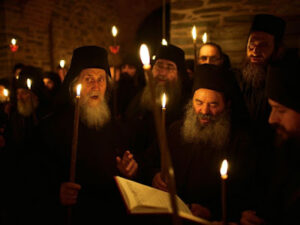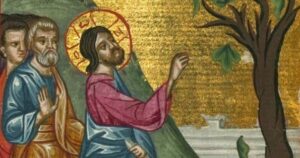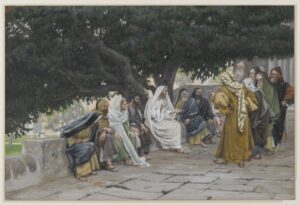Introduction
In our parish churches, Matins/Orthros is normally sung in the morning. So why, you may ask, are we now suddenly having it in the evening? Also and equally odd, why during Holy Week do we have Vesperal Liturgy of the Presanctified Gifts (obviously an evening service) in the morning?
I’m really sorry you asked those questions.
(If you didn’t ask and don’t care, just skip down to the next section, beginning with the video.)
The answer: I don’t know. I’ve searched but never found a definitive explanation. Here’s my uneducated guess:

Our Bridegrrom Matins/Orthros hymn “Behold, the Bridegroom comes at midnight…” (see below) was written in the monasteries, where Matins is a middle of the night service. (I remember, when I was visiting on Mount Athos, the dreaded knock on my door at about 2:30 a.m.: “Pater, the services have begun.”)
It just feels wrong to sing that midnight hymn in the morning light. However, put Matins at 2 a.m. in your church, and you know how many people would attend! So for this Week, in parish use, Matins gets pushed back to the evening before. That leaves Vesperal Liturgy with nowhere to go except the next morning.
Does that explain it? Probably not. If anyone here present has a real explanation I’d be grateful if you’d share it below.
Nevertheless, I think this “upside down” schedule unintentionally reflects the feeling of Holy Week when everything seems out of order, when Good is treated as evil and right as wrong, our deathless God is put to death. Then at Pascha things return to normal again, a “renewed” normal.
The Troparion for “Bridegroom Matins”
“Behold, the Bridegroom comes at midnight, and blessed is the servant whom He shall find awake; but unworthy is the servant whom He shall find sleeping. Beware, therefore, O my soul, do not be weighed down with sleep, lest you be given up to death and be shut out of the Kingdom. But rouse yourself crying: Holy, holy, holy, are You, O our God. Through [the Theotokos], have mercy on us.”
This hymn, sung on three evenings this Week, derives from our Tuesday morning Gospel reading – about the ten bridesmaids waiting for the bridegroom who arrives late, at midnight. Just so, in the middle of the night before Pascha morning, Christ the Bridegroom will rise from death to be “married”, united with His Bride the Church, with us His people forever.
CDs of the beautiful music of Archangel Voices are available from http://www.archangelvoices.com
Later on Palm Sunday
After Christ’s entrance into the City, to everyone’s great surprise He went not to challenge the Roman governor, the political authority, but instead to the Temple, the center of Jewish religion. Seeing men changing money and selling animals at exorbitant prices *, He overturned their tables and drove them out. ”It is written,” He said to them .“My house will be called a house of prayer, but you are making it a den of robbers.” Matthew 21:13 He phrased it so very carefully, because He was not yet ready to be arrested. He made everyone do a sort of “double-take”: Does He mean “My house? or is He only quoting Scripture?”
- Explanation: Animals for sacrifice were required to be purchased in Jewish shekels instead of the usual Roman currency.
Jesus healed a few people *, then He and His disciples went back to Bethany. People had such eager anticipation on Palm Sunday morning… and this is it? this is all?
- How casually Matthew phrases this, as if it was a normal occurrence. With Jesus, it was, of course.
Tonight’s Gospel reading: Matthew 21:18-43
Please read the Gospel texts as we go through Holy Week. There is more in them than I can possibly cover here.
In tonight’s Matins Gospel it is already Monday morning. Jesus and His disciples had stayed overnight with Martha, Mary and Lazarus. It says “He was hungry”. (For once, did Martha not fix breakfast?) Jesus saw a fig tree with no fruit on it, and He cursed it. Matthew says it immediately withered. Mark says that evening on the way back they found it withered.

Why would the Lord do that to an innocent tree? He made it a symbol of the result of the Jewish nation not “bearing the fruit” of faith in Him. (See the parable below.)
I believe the key is in the next line: “If you have faith you can say even to this mountain ‘Be cast into the sea’ and it will happen’”. What was “this mountain” in front of them? Mount Zion, the “temple mount” as some call it today, the center of Judaism. The fig tree was the Jewish nation which would now reject Jesus their Messiah and be “cast into the sea”, so to speak. It would wither like the fig tree, and the Church would become the new, true Chosen People.
When they came to Jerusalem that morning, Christ foresaw and described the destruction of the City and the Jewish nation by the Roman army which would take place forty years later. After that, Temple worship never resumed – not even to this day. Christians saw that as the sign that the One, True and Perfect Sacrifice had been now been made. There was no more need for Jewish Temple sacrifices. (Read Hebrews.)
We hear more about that at morning services early this week.
He came to the Temple. The authorities, now in a panic, began a coordinated last attempt to discredit this “false Messiah”, lest he lead a rebellion and the nation be destroyed. So began the questioning:
“Who gave you authority to do these things?” Christ very smoothly turned it back on them: “I will tell you if you first answer me a question. Was the Baptism of John from God or from men?” They hesitated. If we say from men, the people will turn on us, for they revered John. But we can’t say from God, because John said Jesus was the Messiah. They answered, “We do not know”. Jesus responded, “Then neither will I tell you by what authority I do these things”. Clever! Their attempt didn’t work.
We’ll hear more about the confrontation tomorrow evening. It must have continued for some while. The Gospel accounts surely give us only the core of it.
 James Tissot, c 1890
James Tissot, c 1890
Then Jesus took charge of the questioning: A man told his sons to go work in his vineyard. One said Yes, but didn’t do it. The other said No, but did it. Which did his father’s will? That was obvious: The one who said No, but did it. Jesus responded: I say to you, You say Yes to God, you practice your religion, but when John came and spoke the truth about Me you rejected him – while the sinners, tax collectors and harlots who aren’t “religious”, who say No to God – they believed John. Despite all your pious words you are not doing God’s will.
Herein is a warning to any who worship and pray and say “Yes, Yes” to God all the time and think that’s enough.
Then came Christ’s parable of the vineyard, a fairly common Old Testament image of the Jewish nation. Here the Landowner is God who established their nation and then went off to a far country. The vinedressers are the Jews. God sent His servants the prophets to collect the fruits, but they beat some, killed others. Then the parable moved into the present: Finally the Landowner sent his Son, and they killed Him. So what will the Owner do to those vinedressers? They answered: He will destroy them and give the vineyard to others who will give Him the fruits. His hearers didn’t “get it”: This was about them and what they will do this Week. Jesus said: “I tell you, the Kingdom of God will be taken away from you and given to a nation which will produce the fruits of it.”
And so it was: The rulers of old Israel arranged the murder of the Son of God, their own Messiah, the Savior of the world. Most of their people naturally followed them – just as most people unthinkingly follow their leaders, no matter how wrong they may be. So the Kingdom was taken away from them, and the Church is now the new Israel, the true Israel.
The Church as Israel, the New Israel
This theme is repeated again and again in the New Testament.
This is an especially relevant point today. The claim that the land “between the River and the Sea” belongs to the Jews is now false, according to Christ and the rest of the New Testament. They lost that claim when they murdered their Messiah. Christians who don’t understand this are still stuck in the Old Testament.
Five years ago I wrote two Posts about the Israeli/Palestinian situation. News on this matter coming out of Washington and most American press was then and still is very slanted. Upon re-reading. I still believe what I said was fair to both sides. You can access both those Posts at the end of this Post.
To continue:
Herein Christ sets forth both a promise and a threat.
The promise: The Church, by the word of Jesus Christ, is eternal. In almost every generation we’ve heard that the Church is done for. No, it isn’t. The Church always rises again. The Church is the Body of Christ W ho is risen and cannot die again. He said the power of death will never prevail against His Church. Matthew 16:18 History, to date, certainly bears this out.

The threat: Though the Church is eternal, no part of the Church on earth is necessarily eternal. In the icon above, the Holy Orthodox Church sails on forever through history, despite all the threats against her. However, it is possible for people to fall out of the ship.
Back to the imagery from the parable: We also must produce “the fruits” for God. “The fruit of the Spirit is love, joy, peace, forbearance, kindness, goodness, faithfulness, gentleness and self-control.” Galatians 5:22-2
If we are unfaithful, if we do not produce these fruits, the Church will continue, but without us. He will take the Kingdom away from us, as He took it away from the old Israel, and give it to that part of the Church which will produce for Him. As Saint John the Baptist said, “If God needs children of Abraham, He can raise them up from these stones.” Matthew 3:9
This also is an especially relevant point these days. Orthodox Christians who pervert the Faith and use it as an excuse to attack their Orthodox brothers and sisters in other lands are in process of exiting the Boat, no matter how Orthodox their theology.
The next Post will arrive Sunday afternoon for Monday morning Vesperal Liturgy of the Presanctified Gifts
Father bill, I just read your posts 425 and 426. You did an excellent job of explaining the situation in the Holy land. I will share them with some Evangelical friends of mine. Thank you again.
Christ is risen!
Thank you, John.